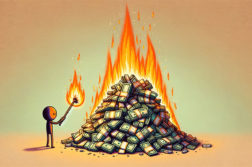Did Wayne Swan make a reasonable fist of his first budget? Undoubtedly, yes. Is it an appropriate budget to the evolving circumstances? Heaven only knows what Harry Hindsight will be saying in a few years time.
The logic behind this split judgement is the sheer uncertainty of the evolving circumstances. At election time the immediate years ahead looked clear. US growth would slow a bit, maybe quite a bit, but the repercussions on the rest of the world would be softened by developments elsewhere, especially in the emerging economies to provide a still congenial outlook for Australia. Indeed, the expected moderate global slowdown could even be seen as of benefit to continued domestic growth as it took the edge off what was becoming an overheated economy late last year.
That was last year. This is this year. The US slowdown has been sharper than expected to the point where growth has just about ceased and unemployment is rising. Moreover the malaise is spreading through the developed old world, although in milder fashion. Western Europe as a whole, a bloc as big as the US, is also slowing but unevenly. Germany is benefiting from years of austerity and favourable markets for its capital and other high end goods in Eastern Europe, Asia and the commodity exporters, but there is considerable weakness elsewhere. Previous strength in Spain, Ireland and the UK has evaporated while Italy remains the cot case it was when Berlusconi was last in power. And in the East a leaderless Japan merely shuffles forward.
Even this year these developments did not seem to matter much for an Australia earning nearly two-thirds of its export revenues from Asia. Continued growth there, especially from the ongoing urbanisation of China and India, would be enough to see us through the globe’s soft patch, and unexpected bonanzas from coal and iron ore prices seemed to confirm the story (although these had more to do with adverse weather impacts on producers than Asian demand).
But petrol and, especially food inflation, sending consumer price rises in most Asian economies way beyond anything the Reserve Bank’s Glenn Stevens has to deal with, are now putting big question marks over that continent’s growth immediately ahead. For years soft monetary policies and low interest rates placed strong tailwinds behind Asian business.
In the last month it has dawned on their policymakers that these favourable policies cannot last. The longer they linger, the bigger the probable bust. The grim choices are between higher interest and exchange rates and fiscal austerity (partly by removing fuel and food subsidies). Divine intervention in the form of abrupt reversals of fuel and grain prices to one side, the chances are that while Asian growth will still be strong by developed world standards it will be a lot weaker going into 2009 than it has been. Both the flow-on from the old world slowdown and their home-grown anti-inflation efforts conspire in the same direction.
So where does that now leave an Australia about to get another large income tax dividend from past resources riches and with this year’s iron ore and coal contract gains refilling the larder? The truth is nobody, not even Treasury or the Reserve Bank, really knows. The game is given away in the opening line of the 32-page Budget Statement 2, Treasury’s traditional treatise on the economic outlook. "Powerful countervailing forces are confronting the Australian economy", it states baldly. That is basically code for saying we don’t really know, but here are some forecast numbers to go on with, which incidentally are not quite the same as proffered by the Bank in its quarterly sermon from its Martin place pulpit last Friday.
Nor are the bureaucrats any more foggy minded than their much higher-paid counterparts in financial markets. There is now a wide range of forecasts of coming growth and inflation in the market, which is why a number, though not all of these financial types (including this scribe) have suddenly gone quiet on the need to cancel or delay the tax cuts. Do we need to stamp down on the economy or should policy prop it up as their American counterparts are desperately doing?
You have to feel for Wayne Swan in these circumstances. Knocking around the political major leagues since his early 20s when he was a fresh-faced sidekick to Mick Young, he is no innocent in the policy process. But he must have felt he had hit the jackpot when he was given control of two of the biggest concentrations of economic expertise in the country eager to serve their new master, especially a dispirited Treasury outfit that had been basically ignored in the later Howard/Costello years.
But there is economics and then there is economic forecasting, whose practitioners in essence are the modern equivalent of witch doctors. Having spent decades observing the game a brilliant forecaster might get about 70 percent of the calls right. That means forecasters need some considerable reserves of humility since they are often wrong, unless they are central bankers whose job tenure depends upon being brainwashed into believing that at least in the public eye they are more infallible than the Pope. Nevertheless, it is disconcerting for a tyro Treasurer to find the sands shifting under him so quickly.
There he was in December with a nice political marriage with the evolving economics. Not only did his predecessors stand condemned of neglecting the human and physical backbone of the economy (a story that is durable enough to serve him well for years to come) but also there were the steak knives thrown in for free. His new advisers were telling him that their previous masters had neglected the day-to-day management of the business cycle, spending so freely that painful retribution was now overdue.
So what did Swan, Tanner et al really do last night? In aggregate terms, basically not very much (which I think was sensible given the uncertainty). The sums are complicated a bit by changes in accounting methods and various dividends and earnings from Australia Post, the Reserve Bank and others, but essentially they just pocketed the $5.4 billion in fortuitous (heavily resources-induced) bottom-line improvements since the November election and added a bit less than $2 billion from their own net revenue scrambling efforts to post a $7.4 billion gain on the 2008-09 estimate last given to the public.
The $21.7 billion surplus has the magic glow of a "2" up front, but the discretionary effort – which is what counts for bearing down on demand, inflation and interest rates – amounted to less than a fifth of a per cent of GDP. This is not something that is going to get you a nomination for world’s greatest Treasurer. That is especially the case when the time frame is extended to 12 rather than just the last 6 months.
Since the May 2007 budget "parameter variations" (as these resource and other gains are called) pumped up the potential 2008-09 surplus by $17.9 billion. Half of these ($8.9 billion) were spent, mainly on the coming tax cuts proposed by Howard and Costello but endorsed by the ALP. Most of the remaining half (the $5.4 billion mentioned above) was saved in this budget as Rudd, Swan and co were good enough to keep their hands out of the treasury coffers. But the first half added to spending, which is not exactly consistent with the last six months rhetoric. In terms of its impact on demand and inflation last night’s effort is broadly neutral, which leaves the Reserve Bank on its own in the short term to control inflation.
Financial markets will be thankful for small mercies. Who knows what Howard and Costello might have done? Perhaps they might have finally learnt some economics. But on their past form they would have continued to party. Keeping a budget surplus around one per cent of GDP would have left high single digits of more billions of new spending and tax cuts. And financial markets will also be impressed that the ALP has been able to slot in its new spending without blowing any valves.
Real business will like the emphasis on infrastructure and skills funds. In the old days surpluses would have gone to paying down debt. Not much of that remains, and in any case eradicating it causes problems. Now it is to be piled up in assets for the future. Little of these will be spent straight away (which is a good idea given the strains in engineering construction), but that is perhaps the most enduring benefit from this budget.
Donate To New Matilda
New Matilda is a small, independent media outlet. We survive through reader contributions, and never losing a lawsuit. If you got something from this article, giving something back helps us to continue speaking truth to power. Every little bit counts.



